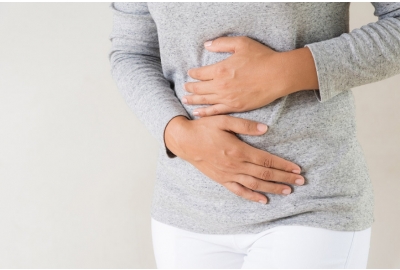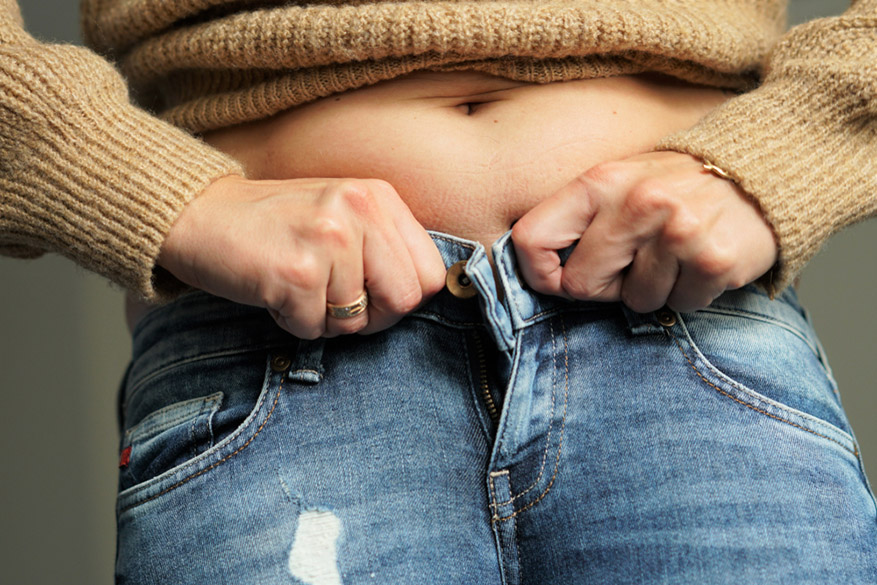
Menopause and Bloating: 4 Ways to Find Relief
As if you weren’t already dealing with enough during menopause, you’ve now begun bloating for apparently no reason. Bloating is a very common side effect of menopause, but that doesn’t mean that it’s any less annoying and uncomfortable. If you want to know what’s causing your menopause bloat and what you can do about it, read on to get some answers.
How does menopause cause bloating?
Bloat occurs when your stomach retains water or gas, and sometimes both. Many of the physical and hormonal changes during menopause can contribute to bloat. You may bloat only in response to certain triggers or at certain points in your cycle, or you may start the day with a flat stomach and get progressively more bloated as the day goes on.

By siam.pukkato / Shutterstock.com
During menopause, your hormone levels change rapidly, and estrogen can lead your body to retain water, resulting in bloat. Menopause can also change your gut flora – i.e., the bacteria that break down your food – which can lead to bloating as well. In addition, your digestion often slows down during menopause, which can also lead to gas as well as constipation. This slower digestive process means that the ingested food has more time to ferment in your digestive tract before being expelled, which can cause gas to build up.
Menopause can lead to weight gain, which leads many women to change their diet as a result. Many women start incorporating raw, high fiber foods such as fruits and vegetables. While these are very healthy for you, they can lead to bloating and gas, especially at the beginning as your body adjusts to the new diet. If you eat too quickly, or too much at once, that can also cause bloating.
Certain activities can also increase the amount of air in your gut. Menopausal women may start chewing gum in response to dry mouth or weight gain, but this can actually increase air intake and lead to bloating. Fizzy, carbonated drinks also increase the air in your gut and lead to bloating, as does smoking (so you should think about quitting if you haven’t already).
Menopause can be a stressful thing in and of itself, and often co-occurs alongside other stressful life events. Stress can wreak havoc on your digestive tract, which includes bloating as well as indigestion, constipation, and other issues.

By Anna Rogalska / Shutterstock.com
How can I stop bloat during menopause?
Bloat is a common side effect of menopause, but that doesn’t mean that there’s nothing you can do to prevent it. The first step you can take is to thoroughly chew your food. Not only does this physically break down the food before it hits your stomach, but it also encourages the production of digestive enzymes, which will further contribute to the digestive process. Chewing a lot will also slow down your pace of eating, another thing that helps reduce bloat.
What you eat is also just as important as how you eat. Certain foods, such as beans and broccoli, are known for causing bloat, even though they are quite healthy otherwise. Your food triggers may be different, however, so pay attention to what you’re eating and how it affects your digestive tract to see if there’s a correlation between your bloating and your diet.
Once you identify potential trigger foods, cut those out to see if it helps. If your bloating is reduced, slowly add in one food at a time to see how your body copes with it. You should also be cautious of other foods — such as dairy products, gluten, and anything fried or fatty — that can cause constipation and other digestive issues, as these can indirectly contribute to bloat as well.

By Maridav / Shutterstock.com
You should also establish an exercise routine. Exercise contracts your core muscles, pushing along digested food and gas, which in turn reduces constipation and bloat. Just make sure not to exercise right after eating, as this can irritate your stomach. (And while you’re at it, you might want to throw in some pelvic floor exercises, which can help reduce bladder leakage and improve your sex life.)
Bloating during menopause can be uncomfortable and embarrassing, but you don’t have to simply resign yourself to it. There are many different steps you can take to prevent bloat before it happens, starting with your diet and eating habits. Refer back to this article if you need some tips for menopause relief from bloat.
Shop All Menopause Relief Products